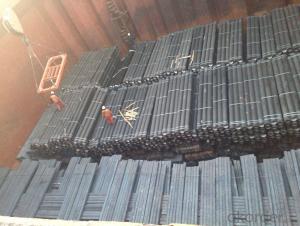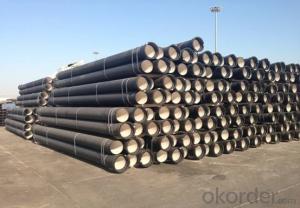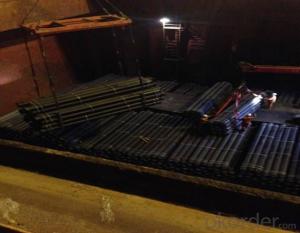DUCTILE IRON PIPE C Class DN350
- Loading Port:
- China Main Port
- Payment Terms:
- TT OR LC
- Min Order Qty:
- -
- Supply Capability:
- -
OKorder Service Pledge
OKorder Financial Service
You Might Also Like
Ductile Iron Cast Pipe is without any defects compare with tradition casting tech, which has many advantages particularly as follow:
(1) High density. In the "vertical upward casting" process, the melt iron of centre liquid column in center crystallizer is continuously feeding for volume shrinkage caused by condensation tube at outer circumference , which lead to be free of shrinkage porosity.
(2) High purity. When melt iron pouring, the mixed impurities such as gas, dross, sand grain which are lighter than melt iron could be eliminated at furnace mouth, its impossible to enter into the crystallizer through the channel, so the melt iron into the crystallizer is very pure.
(3) Strength with toughness. The cooling speed provided by continuous crystallizer is 30 times than sand casting and 5 times than centrifugal casting, and doesn't produce white iron, the eutectic cell volume of continuous cast iron is one eighth to one tenth compare with traditional cast iron. The density of graphite nodule in ductile iron can reach 300-700 pcs/mm2. Therefore, all reason above improve the strength and toughness of continuous cast iron.
(4) Free machining. The high speed cooling make the hardening phase (such as boride, steadite) not appear like reticular, massive or thick, but diffuse like fish bone and pane in shape, moreover, there are tiny graphite flakes inlaid hardening phase. It's free machining in BrinellHardness the range of 250-300HB. However, the Brinell Hardness of 250 is top limit to common metal materials.
(5) Uniform composition of tube wall. The convection mixing of liquid column caused by marching type drawing in crystallizer make the composition of tube wall well-distributed, and concentration gradient very little.
(6) High productivity. To the wall thickness of tube under 10mm, the speed of continuous casting is 1 meter/min, to the wall thickness of tube under 20mm, the speed of continuous casting is 0.5 meter/min, which is high efficiency that centrifugal or other casting tech couldn't reach.
- Q:Can ductile iron pipes be used for underground storage of hazardous materials?
- No, ductile iron pipes are not recommended for underground storage of hazardous materials due to potential corrosion issues and the risk of leaks or contamination.
- Q:The difference between cast iron pipe and ductile iron pipe
- Cast iron pipes, also known as pig iron pipes, ordinary gray iron. Often used in socket connection, the sealing material is usually cement rigid interface.
- Q:Can ductile iron pipes be used in nuclear power plants?
- Ductile iron pipes are suitable for use in nuclear power plants due to their improved flexibility and strength compared to traditional cast iron pipes. They are known for their durability, resistance to corrosion, and ability to withstand high pressure and temperature conditions. These pipes are a reliable and robust choice for transporting water, coolant, and other fluids in nuclear power plants. However, it is crucial to consider the specific requirements and regulations of each power plant before selecting the pipe material. It is necessary to ensure proper testing, certification, and compliance with nuclear industry standards to guarantee the safe and efficient operation of the power plant.
- Q:The role of chromium in nodular cast iron
- In order to further understand the mechanism of chromium in ductile iron, the application of electronic scanning and other test means, from chrome crystal structure, crystallization, solidification, heat treatment transformation principle, further study on the mechanism of chromium in ductile iron.
- Q:How does ductile iron pipe perform in areas with high soil erosion?
- Ductile iron pipe performs well in areas with high soil erosion due to its inherent strength and durability. Its thick walls and strong composition make it resistant to external pressures, including the erosive forces of soil. The pipe's ability to withstand the effects of soil erosion helps ensure its long-term performance and reliability in such challenging environments.
- Q:Can ductile iron pipes be made of flexible waterproof sleeves?
- The casing can be divided into ordinary casing to be 2-4 cm thick than the pipe to be used and fixed to the wall or plate, and the pipe passes through it. Flexible bushing - between the casing and pipe, with flexible material to seal the sealing effect. Rigid casing - that is, between the casing and pipe with rigid material sealed to achieve sealing effect. Waterproof casing - is the use of the casing of the environment is to prevent liquid leakage or leakage into place (such as the pool, septic tanks, basement, etc.) is on the outer wall of the bushing is not less than 1 times increase waterproof wing, this wall is poured in the casing as a whole, not because of swelling shrinkage factor and crack and leakage.
- Q:What are the different sizes available for ductile iron pipes?
- Ductile iron pipes are available in various sizes, typically ranging from 3 inches to 64 inches in diameter.
- Q:Are ductile iron pipes prone to leakage?
- Ductile iron pipes are generally resistant to leakage due to their robust and durable nature. However, like any other infrastructure, they can be susceptible to leakage if they are not properly installed or maintained. Regular inspections, proper installation techniques, and timely repairs are essential to minimize the risk of leakage in ductile iron pipes.
- Q:Can ductile iron pipes be used for underground water treatment systems?
- Yes, ductile iron pipes can be used for underground water treatment systems. Ductile iron pipes are known for their strength and durability, making them suitable for various applications, including underground water treatment systems. These pipes are resistant to corrosion, making them ideal for transporting water, even in harsh underground environments. Additionally, ductile iron pipes have a high load-bearing capacity, allowing them to withstand the pressure and weight of the soil above. They are also versatile and can be easily installed and maintained, making them a practical choice for underground water treatment systems.
- Q:Can ductile iron pipes be used for gravity sewer systems?
- Yes, ductile iron pipes can be used for gravity sewer systems. Ductile iron pipes are known for their durability, strength, and resistance to corrosion, making them suitable for various applications including sewer systems. These pipes have excellent tensile strength and can withstand high pressure and heavy loads, making them ideal for gravity sewer systems where wastewater flows by gravity rather than being pumped. Additionally, ductile iron pipes have a long lifespan and require minimal maintenance, making them a cost-effective choice for sewer infrastructure.
1. Manufacturer Overview |
|
|---|---|
| Location | |
| Year Established | |
| Annual Output Value | |
| Main Markets | |
| Company Certifications | |
2. Manufacturer Certificates |
|
|---|---|
| a) Certification Name | |
| Range | |
| Reference | |
| Validity Period | |
3. Manufacturer Capability |
|
|---|---|
| a)Trade Capacity | |
| Nearest Port | |
| Export Percentage | |
| No.of Employees in Trade Department | |
| Language Spoken: | |
| b)Factory Information | |
| Factory Size: | |
| No. of Production Lines | |
| Contract Manufacturing | |
| Product Price Range | |
Send your message to us
DUCTILE IRON PIPE C Class DN350
- Loading Port:
- China Main Port
- Payment Terms:
- TT OR LC
- Min Order Qty:
- -
- Supply Capability:
- -
OKorder Service Pledge
OKorder Financial Service
Similar products
New products
Hot products
Related keywords




























